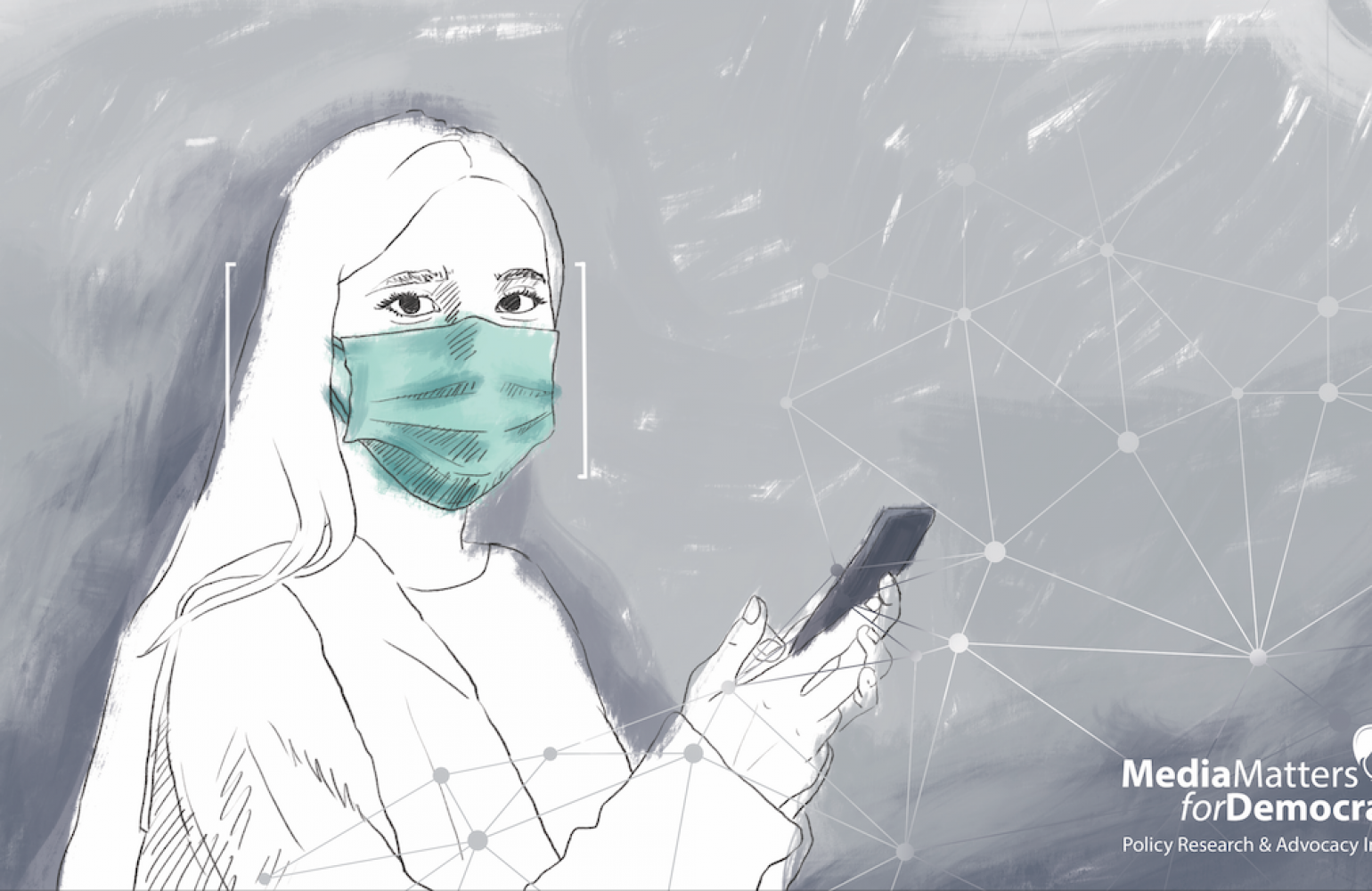Islamabad, 9th April 2020
Joint Statement to the Federal and Provincial Government(s) of Pakistan on Our Concerns Regarding the Excessive Usage of Digital Surveillance Measures and the Lack of Data Protection Laws During the Ongoing Coronavirus Pandemic
Media Matters for Democracy, along with other organisations and individuals, is concerned about the Government of Pakistan relying on invasive measures to combat COVID-19 in the country. We request that the Pakistani government authorities clearly define the scope of the usage of technological solutions that they are in the process of adopting. The undersigned urge the government of Pakistan to tackle the COVID-19 pandemic in a way that does not involve the usage of far-reaching digital technologies to track and monitor individuals, and instead use tech-based solutions in line with human rights principles. The spread of this virus is leading to not only an over-reliance on authoritarian measures, but also demonstrating a disregard towards people’s right to privacy, by governments across the world.
Hence, we urge the Government of Pakistan to develop measures that are legal, necessary and proportionate, as per the suggestions of the United Nations Special Rapporteur on the Promotion and Protection of the Right to Freedom of Opinion and Expression, David Kaye, so as to strictly regulate the collection of people’s personal information. Moreover, it is high time that the Government of Pakistan enacted a robust national data protection law as a top priority in order to protect the right to privacy of all Pakistani citizens.
While efforts have been made by the Ministry of Information Technology and Telecommunications (MoITT) in the past to draft a law that oversees the process of data collection in Pakistan, a robust data protection law has still not been enacted to date. Although the draft law brought forth by the MoITT was a welcome step, it contained loopholes that needed to be addressed, specifically the exclusion of a large amount of people’s personal data that is retained by public bodies. This data is now being used in an ambiguous and arbitrary manner to track individuals as the government is depending on technology to control the spread of COVID-19.
Technology is key in helping the world address concerns related to COVID-19. To counter dependence on surveillance-oriented measures, countries around the world have placed limitations within their data protection laws. While the right to privacy is guaranteed under Article 14 of the Constitution of Pakistan, a law that covers online privacy and data protection has not been passed as yet. Therefore, we urge the government to ensure that the use of technology in these times does not go unchecked, particularly by limiting the scope of data collection during the COVID-19 pandemic. We also request the government to employ transparency in its process of collecting, storing and processing this data.
Media Matters for Democracy, along with the undersigned, believes that disregarding people’s right to privacy while addressing a public health crisis will further decrease people’s trust in state authorities. The Pakistani government’s efforts to protect its citizens cannot come at the cost of a disregard for human rights concerns.
Hence, we strongly urge the government to:
Set a limitation period:The government and its departments must ensure that the process of data collection during the coronavirus outbreak must be solely for the purpose of controlling the spread, and must, therefore, be time-bound. It must be ensured that this collection of data is temporary. The government must also ensure that the collected data, and all of its copies, will be deleted within a given time frame.
Avoid resorting to carceral measures and surveillance of ordinary citizens:It must be emphasised that the coronavirus outbreak in Pakistan signifies a public health emergency. This is not an issue that requires measures stemming from a ‘national security’ approach. Hence, the government must ensure that any surveillance that it is resorting to while fighting coronavirus remains limited in its scope. Strict guidelines should be placed under the initiatives the government is embarking on at this time, such as the location tracking initiative that the Pakistan Telecommunication Authority is overseeing in collaboration with the Digital Pakistan program, the Ehsaas Program, and Corona Relief Tiger Force. The guidelines under these initiatives should clearly state that this surveillance will not be extended beyond dealing with the pandemic, particularly by Pakistan’s law enforcement agencies and the police. Moreover, the government should not rely on encouraging ordinary citizens recruited under its initiatives to track and report other ordinary citizens. The government must refrain from militarising a health emergency by creating so-called forces and asking citizens to surveil other people around them. This mindset perpetuates a mob mentality that will have disastrous consequences in the long run.
Ensure the privacy and confidentiality of patients:Pakistani citizens should not be asked to choose between privacy and healthcare. The government must ensure that all personal data that is being collected and processed is stored under guidelines that ensure data protection, and access to it is limited to authorised individuals only. Moreover, the Government of Pakistan must avoid perpetuating further stigma against people who have tested positive for COVID-19. Asking a citizens-led ‘tiger force’ to keep a check on other citizens could have negative repercussions on those who have been exposed to the virus, potentially leading to unemployment, discrimination, eviction and even violence. The government should also ensure that patient confidentiality is protected in hospitals across Pakistan at all costs, even as they take measures to detect those who may have contracted the virus.
Protect marginalised communities:The Pakistani government should ensure that healthcare services across the country are easily accessible and available to people regardless of their sexual orientation, gender identity, age, religion, ethnicity, class and nationality status. The government should take additional measures to cater to underprivileged people, including the disabled and elderly. Moreover, the government should devise a governance plan that is cognisant of the class and gender inequalities that will be exacerbated over time as a result of this crisis. Therefore, access to emergency helplines, shelters and other psychosocial and legal support services should remain undeterred during this time, particularly for survivors of violence and abuse who are suffering at their homes at the moment.
Only resort to measures that are necessary and proportionate:The government must ensure that the collection and retention of data during this time should be necessary and proportionate, in line with the purpose of combating the spread of COVID-19. The government must ensure that restrictions exist to counter the unchecked and unauthorised use of people’s personal data for purposes that are not related to tackling this public health emergency.
Ensure transparency and accountability:The government must ensure that it ensures transparency in all the steps that it takes involving the use of technology, particularly in regards to the obtainment of citizens’ electronic and biometric data. In events where data and sets of data are breached, the government must ensure that this issue is duly and immediately communicated to the public, while also making sure that accountability is maintained at all times.
Hence, we request the Government of Pakistan to issue a formal statement to demonstrate how it plans to address concerns related to privacy and data protection without resorting to mass surveillance measures, while also prioritising the protection of marginalised communities and patient confidentiality during these difficult times.
—
Signed by concerned organisations and citizens;
Organisations/Collectives:
- Media Matters for Democracy (MMfD)
- Institute for Research Advocacy and Development (IRADA)
- Freedom Network (FN)
- Pakistan Press Foundation (PPF)
- Digital Rights Foundation (DRF)
- Indus Public Lawyers Front
- Bolo Bhi
- Human Rights Commission of Pakistan (HRCP)
Individuals (Name, Affiliation):
- Asad Baig, Media Matters for Democracy
- Sadaf Khan, Media Matters for Democracy
- Hija Kamran, Media Matters for Democracy
- Zoya Rehman, Media Matters for Democracy // Women Democratic Front
- Adnan Rehmat, Pakistan Press Foundation
- Aftab Alam, IRADA
- Iqbal Khattak, Freedom Network
- Owais Aslam Ali, Pakistan Press Foundation
- Adnan Ahmad Chaudhri, Editor/Researcher (Freelance)
- Waqas Naeem, Media Matters for Democracy
- Alia Amirali, lecturer, Quaid-e-Azam University
- Umer Gillani, Advocate High Courts
- Salwa Rana, Advocate Lower Courts
- Salman Zaidi, Jinnah Institute
- Amel Ghani, Media Matters for Democracy
- Ayesha Mushtaq, Jinnah Institute
- Mariam Ali Bokhari, Jinnah Institute
- Meera Nadeem, Jinnah Institute
- Yasser Latif Hamdani, Advocate High Courts
- Tahira Abdullah, Human Rights Activist
- Luavut Zahid, journalist and researcher
- Shahzaib Raja, journalist and researcher
- Rubeha Tahir Ghauri, Pakistan Coalition for Education
- Mehwish Batool, Lecturer, Forman Christian College – A Chartered University
- Hina Gul Roy, Lawyer
- Haseeb Siddiqui, Privacy and Security Consultant.
- Amna Mawaz Khan, artiste
- Noor Ejaz Chaudhry, Advocate High Court
- Muhammad Haider Imtiaz, Advocate High Court
- Heba Islam, Johns Hopkins University

